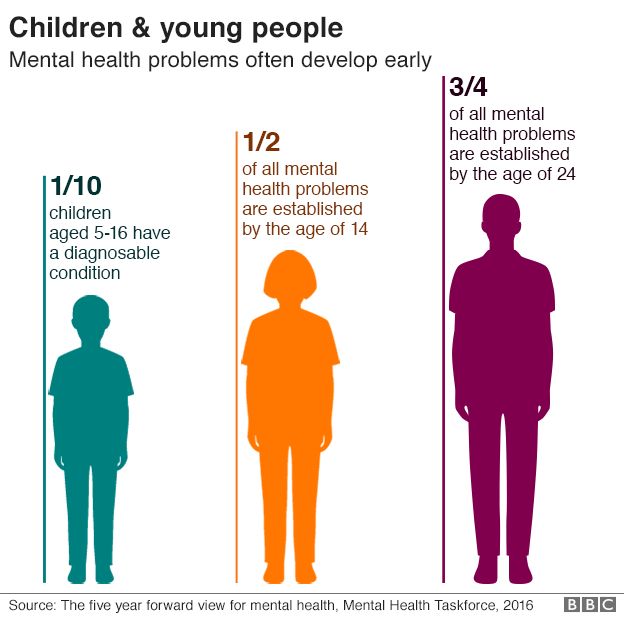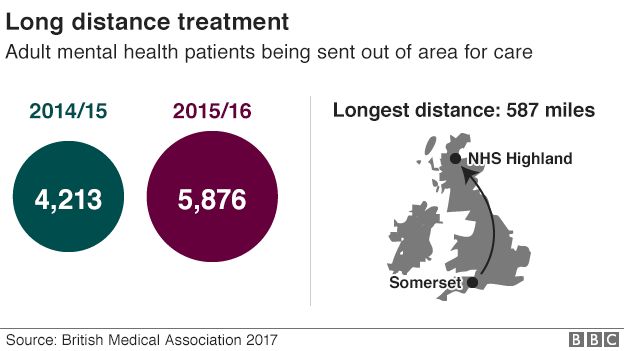Is Britain Mentally Ill?
We have all heard the statistic that one in four people will live with a
mental illness every year. In 2017 alone, 5,821 people took their own life with
75% of those being males, making suicide the biggest killer in men between 20
and 49 years old. Though this may seem shocking, it is estimated that one in
fifteen people will attempt suicide in their lifetime. Many celebrities have come out in support and
solidarity; with faces such as Ryan Reynolds and Dwayne Johnson opening up
about their struggles with anxiety and depression. Although awareness has risen
through TV and film, only one in eight of those with mental illness receive
treatment. Medication is the most common treatment, as the waiting list for
therapy can be up to two years. The increase and acceptance of mental illnesses
is a step in the right direction, however, to tackle the mental health crisis
in the UK, there needs to be an influx of funding to NHS mental health
services.
 It is obvious that with the rise in awareness of mental illness, there
will be more people seeking help with their mental wellbeing. Yet, a rise in
awareness cannot count for the drastic rise that we see; studies suggest that
as a whole more recent generations have a markedly higher rate of anxiety and
depression related issues. Though many severe illnesses are related to genetic
factors, environmental issues play their part. More than ever, younger people
are feeling pressure to succeed in finding a respected career, buy a house, and
get married. This is despite the fact that these goals are harder to obtain
than in older times. Stable jobs are harder to come by, house prices have risen
and the cost of marriage is higher than ever. World issues also have a part to
play in the feeling of dread or helplessness faced by many; unstable
governments and international relations have been quoted as stressors in one
out of ten teenagers surveyed. They report feelings of uncertainty and a lack
of control.
It is obvious that with the rise in awareness of mental illness, there
will be more people seeking help with their mental wellbeing. Yet, a rise in
awareness cannot count for the drastic rise that we see; studies suggest that
as a whole more recent generations have a markedly higher rate of anxiety and
depression related issues. Though many severe illnesses are related to genetic
factors, environmental issues play their part. More than ever, younger people
are feeling pressure to succeed in finding a respected career, buy a house, and
get married. This is despite the fact that these goals are harder to obtain
than in older times. Stable jobs are harder to come by, house prices have risen
and the cost of marriage is higher than ever. World issues also have a part to
play in the feeling of dread or helplessness faced by many; unstable
governments and international relations have been quoted as stressors in one
out of ten teenagers surveyed. They report feelings of uncertainty and a lack
of control.
As those with a lower income are more likely to have issues with their
mental health, the NHS is relied upon to provide care for those in need. Nevertheless,
there has been an 8.25% (or £600million) shortfall in funding since 2010. This
has led to 60% of local authorities cutting or freezing their Child and Adolescent
mental health schemes. Even with care provided, doctors are not supplying
adequate support; between 2003 and 2013, there were an average of 1,270 patient
suicides per year. Patients being detained have been kept in hospital just long
enough to exit their crisis, to be sent home without further care, only to
reach crisis again and for the cycle to repeat itself. There is simply not
enough money or resources at present to cope with the care needed. For those
who do receive proper treatment, it is often far from home. For many, this is
simply not viable; there is major expense in travelling long distances
(especially if one cannot drive); others may feel unable to travel that far
through anxiety and other illness.
The Mental Health Act has not been renewed since 1983, leaving those
most vulnerable unprotected by an out of date system written to protect the
public rather than the individual. Furthermore, patients have no say in their
care plans or advocate/nominated person. The prime minister ordered an
independent review of the current mental health care provided. The report
suggested 150 changes to the current mental health act and subsequent care of
patients, the government are enacting two of these. Patients will now be able
to nominate an advocate and powers to challenge their treatment plans if they
are not suited.
Other recommendations that I feel are important to note are:
- · Discontinuing the use of police cells for people in crisis.
- · Increase distinguishability between those who fall under The Mental Capacity Act and The Mental Health Act.
- · The creation of Advanced Choice Documents- allowing patients to agree to treatment before crisis or their capacity decreases.
- · The Government should resource policy development looking into alternatives to detention, and prevention of crisis.
- · There should be better access to long-term support for everyone to keep them well and prevent admission.
Although the increased positivity behind seeking help for mental illness
is a huge stride, the lack of help available is abysmal. Nihara Krause put it perfectly when she said that ‘there are
fewer services to signpost [children] to’. The NHS is overwhelmed with those in
need with all ailments. The government needs to realise that our mental health
is just as important as physical health, we need help. Cutting or freezing
funds to vital services is a disgrace, and the lack of impact the report has
made to legislation is even more so.
Charities
available to help:
Time to Change, Mental
Health Foundation, BACP Find a Therapist Directory, PANDAS Foundation, The Centre for Mental Health.

Comments
Post a Comment